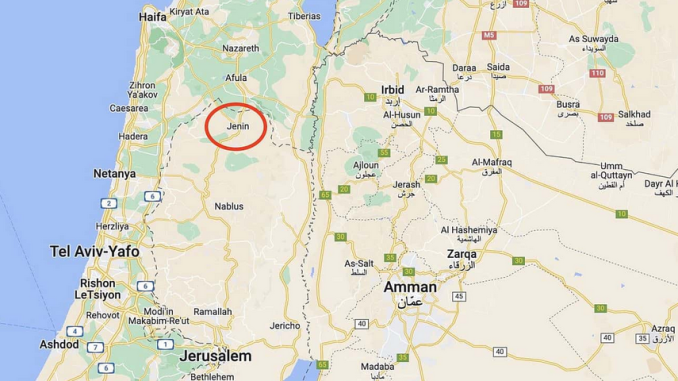Is citing unproven rumors an appropriate professional way of reporting?
Moshe Phillips | November 13, 2024
 Jenin. Source: Google Maps.
Jenin. Source: Google Maps.
For a magazine that prides itself on journalistic standards, Editor & Publisher seems to throw those standards right out the window when Israel is the subject of their reporting.
A feature story in the October issue of E&P—the leading trade magazine of the U.S. news media industry—described the difficulties faced by some reporters covering the war between Israel and Hamas in the Gaza Strip. But the biggest difficulty with the article was its parroting of blatant anti-Israel falsehoods.
The author of the article, Gretchen A. Peck, who is a contributing editor, set the tone in her introduction, by describing how Hamas “militants” (she never calls them terrorists) attacked Israel, resulting in a “brutal” response from Israel (she never uses such adjectives about Hamas).
Peck states as fact that “at least 41,020 Palestinians have been killed, according to the Ministry of Health in Gaza,” without explaining that the “Ministry of Health” is, in fact, controlled by Hamas. She also fails to note that about half of the casualties in Gaza have been terrorists, not civilians.
Peck proceeds to interview several journalists based in the Middle East. She repeatedly quotes them making false statements but never corrects them.
First up is Julian Borger, world affairs editor for the British newspaper The Guardian. He refers to what he calls “the mass killing of civilians” by Israel, using terminology that makes it sound as if Israel is perpetrating another Holocaust.
Borger makes a big point about the fact that journalists have been among the dead in Gaza. He puts it this way: “There have been suspicions that journalists have been particularly targeted [by Israel]. That may be true, but it’s unproven.”
If it’s unproven, if it’s just a “suspicion,” then why is Borger saying it in public, and why is E&P giving him a platform to spread it? Is that an appropriate professional way of reporting—to cite unproven rumors?
Borger recalls that he was reporting from Jerusalem during the 2000 Camp David Summit. “Negotiations broke down,” he recalls. In fact, they didn’t just “break down”—Yasser Arafat rejected Israel’s offer of wide-ranging concessions, and then launched the mass-murder spree known as the Second Intifada. But for some reason, Borger and E&P didn’t think that was relevant to mention.
Peck, summarizing her conversation with Borger, notes that “Hezbollah has joined the fight, firing rockets into Israel’s northern towns in retaliation for Israel’s campaign in Gaza.” Even the most minimally experienced fact-checker could have caught that bonehead error; Hezbollah began firing on Oct. 7, in conjunction with the Hamas attack, not in response to any “Israeli campaign in Gaza,” which had not yet even begun.
Peck then turns to Nabih Bulos, Middle East bureau chief for the Los Angeles Times. Among the “challenges” Bulos faces, Peck writes, is the fact that “aid convoys are routinely ambushed and robbed.” But she doesn’t inform E&P readers that Hamas is the one doing the ambushing and robbing.
Bulos says that “it’s a big challenge to make sure the people you’re working with are not problematic,” and he acknowledges that he is “reliant on local journalists” in Gaza. What he means is that he relies on “journalists” who are almost certainly part of Hamas or at least pro-Hamas, since there are no anti-Hamas journalists in Gaza. You see the pattern: Neither Bulos nor Peck acknowledges facts that make Hamas look bad.
The editors of E&P then compound the problem by littering Peck’s feature with photographs that hammer home the idea that Israel is the aggressor. The reader is shown flames billowing “after Israeli forces hit a high-rise tower in Gaza,” as if Israel attacks high-rise towers for no apparent reason. There’s a burned field, due to “an Israeli attack on south Lebanon.” Notice—not a strike against Hezbollah terrorists, but rather an “attack on south Lebanon.”
Another photo shows “wreckage of a mosque targeted in an Israeli strike on Jenin’s refugee camp”—you know, because Israel is devoted to destroying mosques—and “a road destroyed by frequent Israeli incursions on Jenin’s refugee camp”—because, I suppose, Israel just hates refugee camps, not because it pursues terrorists there, and terrorists plant mines under the roads.
Editing and publishing are not easy in war-torn parts of the world. But editors and publishers have an obligation to report the facts objectively, not slant the news against those whom they dislike. And they need to have some fact-checkers on staff. Clearly, Editor & Publisher needs to hire a few of those.
Moshe Phillips is national chairman of Americans For A Safe Israel (AFSI), a leading pro-Israel advocacy and education organization.



Leave a Reply
You must be logged in to post a comment.